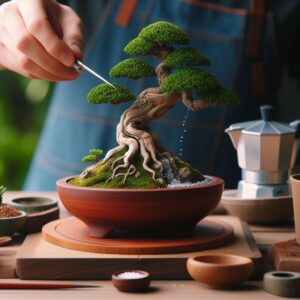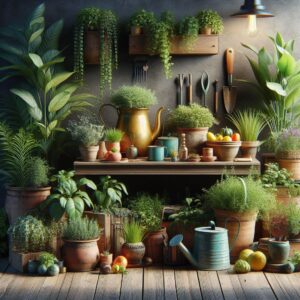Step into the forefront of gardening innovation where technology seamlessly intertwines with traditional horticulture. Join us on an extensive exploration of “Smart Plant Care: Utilizing Technology for Healthier Plants.” In this comprehensive guide, we’ll unravel the multifaceted ways technology is transforming the landscape of plant cultivation, offering insights into how you can harness the power of innovation for a greener and more connected gardening experience.
The Intersection of Technology and Plant Care:
In an era marked by groundbreaking advancements, the fusion of technology and plant care signifies more than just a fleeting trend; it represents a paradigm shift towards a holistic and efficient approach to nurturing our botanical companions. Let’s embark on a journey through the diverse possibilities that smart plant care unfolds.
1. Smart Soil Sensors: Delving into the very roots of healthy plants, smart soil sensors emerge as the unsung heroes of contemporary gardening. Beyond merely measuring moisture, these devices provide real-time insights into soil nutrient levels and temperature. Armed with this granular information, you gain the ability to fine-tune watering and fertilization practices, creating optimal conditions for robust plant growth.
2. Automated Irrigation Systems: Bid farewell to the uncertainties of traditional watering schedules with the advent of automated irrigation systems. These intelligent setups, driven by sophisticated controllers, ensure precise and timely water delivery. This not only conserves valuable water resources but also mitigates the risk of overwatering, a common culprit for plant stress and diseases.
3. Plant Health Monitoring Apps: Transform your smartphone into a robust ally with dedicated plant health monitoring apps. Utilizing image analysis and real-time weather integration, these applications offer personalized care recommendations. Stay vigilant about your plant’s well-being and proactively address concerns with a mere tap, creating a seamless fusion between technology and the nurturing of nature.
4. Smart Light Solutions: Indoor gardening enthusiasts, rejoice! Smart light solutions, featuring programmable LED systems, replicate the natural light spectrum. Tailor light intensity and duration to suit different plant species, ensuring optimal photosynthesis and growth, even in the absence of direct sunlight.
5. AI-Powered Plant Diagnostics: Embrace the future with AI-powered plant diagnostics. These advanced systems analyze data from various sensors, images, and environmental factors to diagnose potential issues. Receive instant insights into nutrient deficiencies, diseases, or pest infestations, empowering you to take timely and targeted corrective measures.
The Benefits of Smart Plant Care:
- Efficiency: Streamline your gardening efforts with automated systems.
- Precision: Tailor care routines based on real-time and accurate data.
- Prevention: Identify and address issues before they escalate.
- Optimal Growth: Create the perfect environment for plant flourishing.
Challenges and Considerations in Smart Plant Care:
While the benefits of smart plant care are vast, it’s crucial to consider factors such as initial setup costs, ongoing maintenance, and the necessity for a reliable internet connection. A comprehensive assessment of these aspects ensures a seamless integration of technology into your gardening routine.
Conclusion: In navigating the digital age, smart plant care emerges as a beacon of innovation in gardening. Embrace these technological marvels to elevate your plant care routine, ensuring not just healthier plants but a greener, more sustainable future for your indoor and outdoor spaces.
FAQ Section
Q1: How do smart soil sensors help plants? A1: Smart soil sensors provide real-time insights into soil nutrients and temperature, optimizing watering and fertilization for plant growth.
Q2: What benefits do automated irrigation systems offer? A2: Automated systems ensure precise watering, conserving water and preventing overwatering.
Q3: How do plant health apps enhance care? A3: Apps use image analysis and real-time weather data for personalized care recommendations, addressing plant concerns proactively.
Q4: Why are smart light solutions important for indoor gardening? A4: Smart lights with programmable LEDs replicate natural light, promoting optimal photosynthesis and growth for different plant species.
Q5: How does AI-powered plant diagnostics help? A5: AI diagnostics analyze data to provide instant insights into nutrient deficiencies, diseases, or pests, enabling timely corrective measures.



